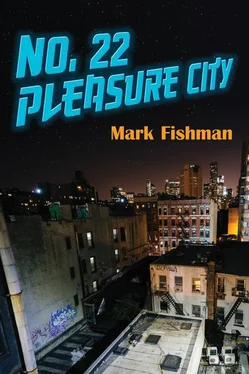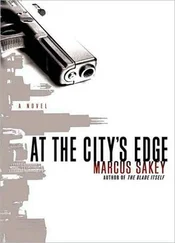Eto calculated with his eyes shut that if there were eighty-five cars with 70-foot hoppers and a conservative five feet between them the length of the mixed merchandise freight train was more than 6000 feet long. He opened his eyes and sighed.
When the Texas Eagle lurched forward and the train was on its way northeast again, Eto’s father set the newspaper in his lap and looked at his son, and beyond him, the landscape changed from broad, pleasant pastures, grassy flatland and trees to a used car lot and a warehouse at the outskirts of a town. Behind a pair of glasses with thick lenses his enlarged eyes followed Eto’s gaze and fell into the passing street of the small Midwestern town as the train went by the offices of the Great Lakes Excavating Company and the cream-colored brick two-story building of Allied Insulation.
“Another small town,” he said unimaginatively to his son. “That makes a half-dozen since we left the big city.”
Eto turned, looked at his father and smiled faintly.
He started to tell his father to knock it off, small talk wasn’t interesting to anybody, especially to him, saw kindness in his father’s expression and heard himself say: “The Midwest is the sum of its small towns,” with a voice that told of the years he’d lived in America.
A man the size of three men got up from his seat and went past them. He wore a pair of black, knee-length shorts and a black, sleeveless T-shirt and his exposed, large belly hung over the waistband of his shorts. He wore his long hair in a ponytail and had a trimmed Vandyke beard and mustache. His flabby white arms were covered in tattoos. He might’ve been the biggest man they’d ever seen if they hadn’t come from a country of sumo wrestlers.
He was downstairs in the toilet for five minutes. They heard him breathing hard as he climbed the narrow stairs from the lower level of the train car, their eyes followed him when he heaved past using the luggage rack on either side as support on the journey back to his seat.
“A man that size—” Eto’s father said.
“Yes,” Eto said. “They eat a lot.”
They looked at each other.
“Let’s get some rest,” Eto said, reaching out to put his hand on his father’s arm.
“There are blank pages in the book,” Eto’s father said. “I’d like to fill them in.”
“You mean you want to tell me something?”
“I’m not going to be greedy.”
“I know that.” Eto straightened himself in the seat. “That’s why we’re going where we’re going. The accountant, then straight to the bank.”
“I thought it was settled,” Eto’s father said.
“It will be.”
“That accountant hasn’t done anything stupid, has he?”
Eto’s father gripped the edge of the newspaper in his lap.
“Nothing’s wrong,” Eto assured him.
“The money I’ve been sending—”
“We’re going to figure it out.” Eto squeezed his father’s arm. “What you want for yourself and what I want for myself make up a single item we can work on together.”
“You want the same thing I want, don’t you?”
“That’s right.”
Eto’s father let go of the newspaper and it fell to the floor beneath the seat in front of him. The Texas Eagle kept on its tracks going northeast. Eto bent down and picked up the paper and put it in his father’s hands.
“There’s nothing to worry about,” Eto said. “I want you to meet the accountant. So he can put a face to the transfers you’ve been sending. He’s been asking questions and he’s talking about the tax people. I don’t want him to get the wrong idea.”
“Taxes,” Eto’s father said, swallowing the word after it’d made a lump in his throat.
Two days later they learned that the accountant, with the help of a woman at the bank, had cooked the books and a certain amount of money got lost and it amounted to a lot of money. A large part of it disappeared without a trace and what was left of it had been diverted to where Eto and his father couldn’t touch it and the two crooks could profit by it. In the meantime the accountant had put the government in the picture on taxes due in order to muddy the whole thing, and what money remained for Eto and his father was just enough to pay them. Because the money Eto’s father was funneling into the account was itself embezzled from the company he worked for in Japan, they couldn’t do anything about it.
His father went back to his job as an accounts manager for an investment firm in the fifty-four-story main tower in Roppongi, a vast office, residential and cultural complex of concrete and steel developed by Mori Building at the center of Tokyo, while Eto, with no money of his own, had to make a living right away, so he stayed in the Midwestern city and went to work at the Kawamura Agency.
Eto yawned, shook his head. He stared at the small garden in the middle of Lavergne Terrace. He looked at his wristwatch. It was eight forty-five. He left the supporting wall and crept to a nearby doorway. The faint glow of a streetlamp lit his face. He heard footsteps coming from the direction of Delaplaine Road. It was Aoyama. They walked silently together along Lavergne Terrace toward Nightingale Lane.
It was a quarter to eight, but the agency wasn’t empty. Kawamura was still in his office with the door closed. Asami, just outside his door, switched off the desk lamp and got up and went through the agency and turned off all the lights that other employees left on because they didn’t listen to Kawamura when he told them he wanted to save as much money as he could on electricity because there was so much energy wasted in the office that they didn’t have any to spare.
The blue evening light and the stray clouds and the end of the working day hung like a veil over the agency, the building, the neighborhood streets and the city. And that veil kept a natural warmth from drifting out of all the inhabitants and the buildings and made the city a particularly comfortable place for the night. Asami went quietly to Kawamura’s door and knocked once and went in as if she were floating on air.
Kawamura looked up from the handwritten notes on the yellow notepad in his left hand and broke into a smile. Asami blushed, smiling. There was a long silence and the room was so quiet that the noises from the huge city gradually grew more audible. A car backfired. Kawamura looked down at his scribbling on the yellow sheet of paper.
Finally he observed, as if talking to himself: “If I could just figure an angle to cover Shimura so he doesn’t lose face and I don’t lose too much money.” He looked up again. “Please, sit down.”
“I don’t want to disturb you.”
“You won’t ever disturb me.”
Asami sat down in the chair opposite him.
“You were angry with him, weren’t you?” she said.
“I made him think I was. But I know what it’s like to have friends and want to help them.”
There was a short pause and taxis hooted in the stillness. Asami had nothing to say to the kindness Kawamura had inside him even though he tried to hide it. She was happy she was going to marry him. The difference in their age didn’t matter. Nothing mattered but the fact that she loved him. And she was sure of that.
“Do you want to have dinner with me, Kawamura- san ?”
He tore the top sheet from the notebook and crumpled it slowly and dropped it in the wastebasket. A large neon sign on the roof of the building opposite blinked on as true night fell soundly on the Midwestern city.
 Shimura edged his car forward in heavy traffic away from downtown. He switched off the music and thought about what Kawamura had said to him and didn’t worry too much about it because he’d known him for such a long time and was used to hearing him go on about the costs of running the agency. And Kawamura was soft under the cold surface of a man running a business. But Shimura wanted to make it right for his own sake. He figured he’d be working for months without pay.
Shimura edged his car forward in heavy traffic away from downtown. He switched off the music and thought about what Kawamura had said to him and didn’t worry too much about it because he’d known him for such a long time and was used to hearing him go on about the costs of running the agency. And Kawamura was soft under the cold surface of a man running a business. But Shimura wanted to make it right for his own sake. He figured he’d be working for months without pay.
Читать дальше

 Shimura edged his car forward in heavy traffic away from downtown. He switched off the music and thought about what Kawamura had said to him and didn’t worry too much about it because he’d known him for such a long time and was used to hearing him go on about the costs of running the agency. And Kawamura was soft under the cold surface of a man running a business. But Shimura wanted to make it right for his own sake. He figured he’d be working for months without pay.
Shimura edged his car forward in heavy traffic away from downtown. He switched off the music and thought about what Kawamura had said to him and didn’t worry too much about it because he’d known him for such a long time and was used to hearing him go on about the costs of running the agency. And Kawamura was soft under the cold surface of a man running a business. But Shimura wanted to make it right for his own sake. He figured he’d be working for months without pay.










